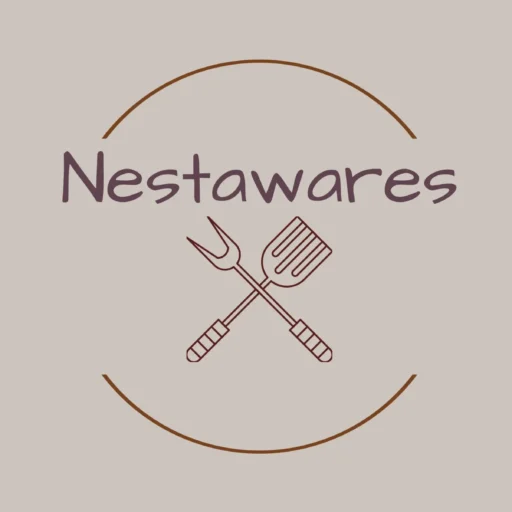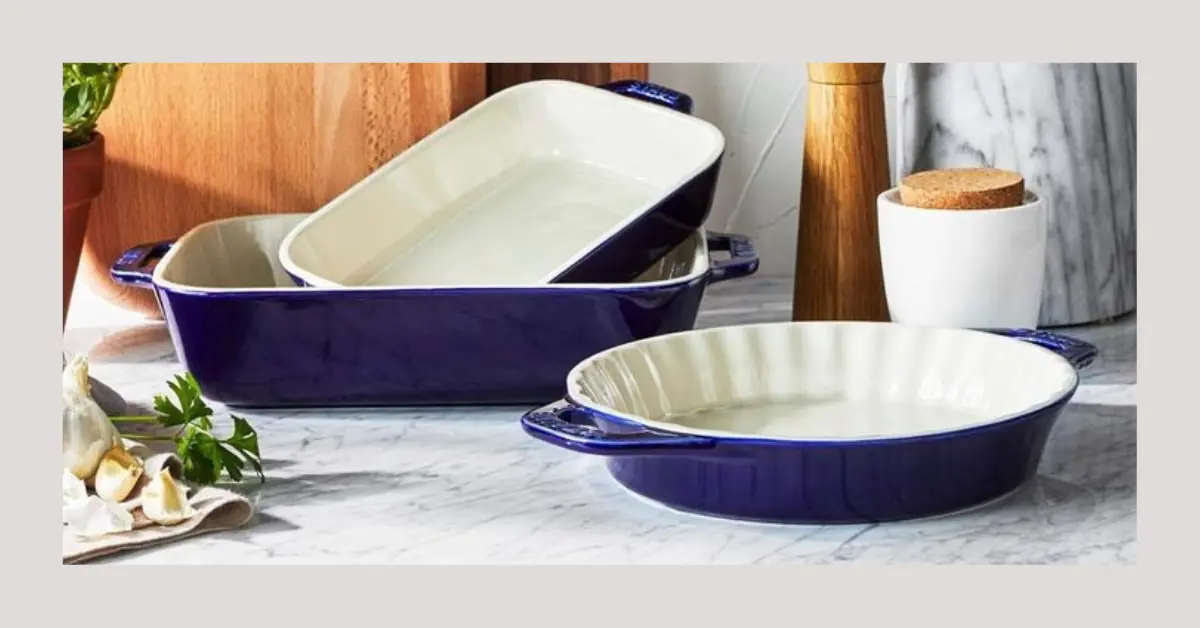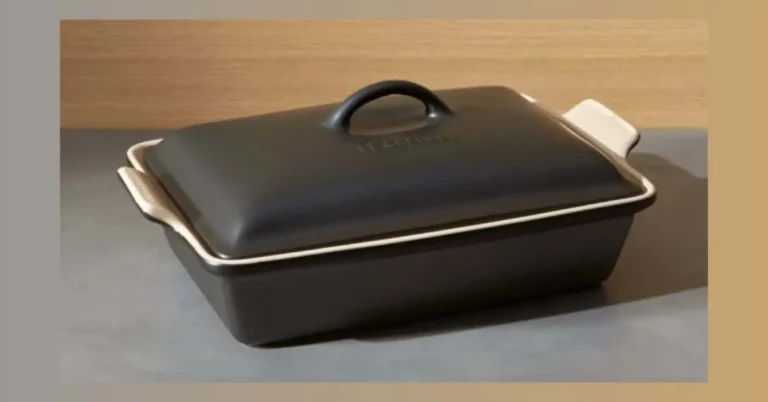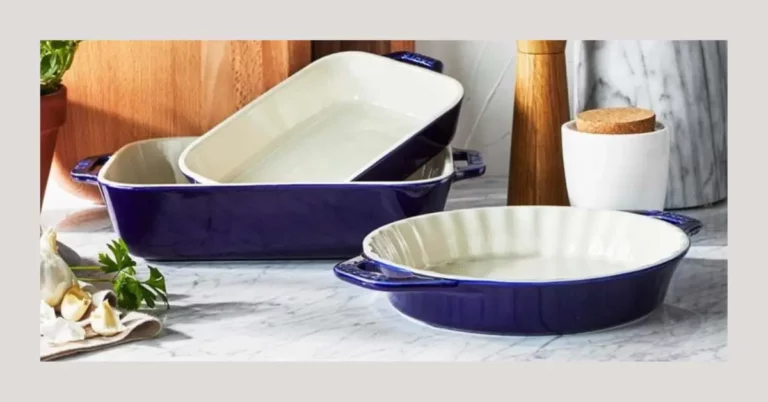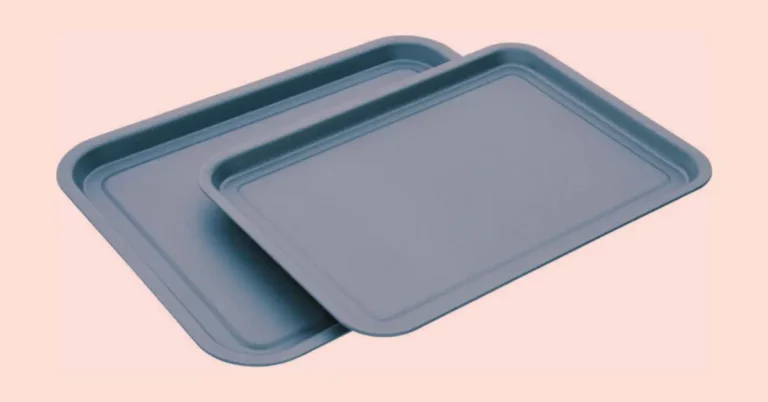Disclosure: As an Amazon associate, I may earn from qualifying purchases
Advantages of using Unglazed Stoneware Bakeware
- Durable: Stoneware is highly durable and can last for a long time if properly taken care of.
- Even heating: They distribute heat evenly and retains heat, ensuring that your food is cooked evenly.
- Non-stick surface: Over time, the porous surface becomes naturally seasoned, creating a non-stick surface that makes it easy to release food.
- Versatile: They can be used in the oven, microwave, and even on the stovetop.
- Safe: They are made from natural materials and is free from harmful chemicals like PFOA and PTFE.
Drawbacks of using Unglazed Stoneware Bakeware
- Porous: The porous nature of stoneware means that it can absorb flavors and odors over time, which can affect the taste of your food.
- Fragile: They can be fragile and may break if dropped or exposed to rapid temperature changes.
- Challenging to clean: They require special care when cleaning, as it cannot be washed with soap and water. They must be cleaned with hot water and a scraper.
- Heavy: Stone-built cookware can be heavy, making it challenging to handle and store, especially if you have limited space in your kitchen.
- Expensive: They can be expensive compared to other types of bakeware.
Recipe Ideas that are Perfect for Cooking with Stone Bakeware
Here are some ways you can use stone baking dishes:
- Baking bread: Unglazed stoneware bakeware is great for baking bread because it can retain heat and moisture, which creates a crispy crust and soft, fluffy interior.
- Roasting meat: Stone is a good choice for roasting meat because it can help to distribute heat evenly and can withstand high temperatures.
- Casseroles and gratins: They are also a great option for dishes that require longer cooking times, such as casseroles and gratins. The material can help to keep the dish warm for longer, and can provide a nice even bake.
- Cooking vegetables: They can be used to roast vegetables, providing a delicious caramelized flavor.
- Serving dishes: They are used for serving dishes as it can keep food warm for a long time and provide an attractive presentation.
- Pizza: Cookware constructed from stone can also be used to bake pizza, creating a crispy crust and evenly cooked toppings.
Frequently Asked Questions
Does stoneware have toxins?
Unglazed stoneware does not contain any toxins as long as it is made from natural clay and does not have any added chemicals or glazes.
However, the glazed ones can contain small amounts of lead or cadmium if the glaze is not properly formulated or applied.
Ensure that you only buy kiln-fired ovenware from reputable manufacturers who follow strict regulations to ensure the safety of their products.
Always check the label or contact the manufacturer to determine if they contain any harmful substances.
However, the glazed ones can contain small amounts of lead or cadmium if the glaze is not properly formulated or applied.
Ensure that you only buy kiln-fired ovenware from reputable manufacturers who follow strict regulations to ensure the safety of their products.
Always check the label or contact the manufacturer to determine if they contain any harmful substances.
Can stoneware be microwaved?
Yes, stoneware can be microwaved. It is microwave safe, but beware that they can get very hot when microwaved, so it is important to use oven mitts or potholders to handle it.
It is not recommended to use stoneware with gold or platinum rims or decorations in the microwave, as these can cause sparking.
It is not recommended to use stoneware with gold or platinum rims or decorations in the microwave, as these can cause sparking.
Which is better - ceramic or stoneware bakeware?
Ceramic and stoneware are both popular materials for bakeware, and which one is better can depend on personal preferences and the specific use case. Here are some general differences to help you though:
- Material: Ceramic bakeware is made from clay that is fired at high temperatures, while stoneware is made from a specific type of clay that is fired at even higher temperatures, making it denser and more durable.
- Heat retention: Stoneware is known for its excellent heat retention, which allows it to cook food evenly and retain heat for longer periods of time. Ceramic bakeware can also retain heat well, but may not be as effective as stoneware.
- Durability: Stoneware is generally more sturdy and resistant to chipping and cracking than ceramic bakeware. However, both materials can break or chip if dropped or mishandled.
- Cleaning: Both ceramic and stoneware are dishwasher safe and easy to clean, but some types of ceramic may require more careful handling to prevent damage.
Is Pampered Chef stoneware worth it?
The worth of Pampered Chef stoneware depends on personal preferences and needs. Pampered Chef is known for its durability, even heating, and natural nonstick surface.
It can be used for a variety of cooking and baking tasks and can last for many years with proper care. It may be more expensive than other types of bakeware, and some people may prefer other materials or coatings.
It can be used for a variety of cooking and baking tasks and can last for many years with proper care. It may be more expensive than other types of bakeware, and some people may prefer other materials or coatings.
Does all stoneware contain lead?
Not all stoneware contains lead, but some unglazed ones may contain small amounts of lead.
Lead is more commonly found in antique or handmade pottery rather than modern commercial stoneware that has been tested for safety.
It is recommended to only purchase kitchenware that has been tested for lead and confirmed to be safe for food use. It is also important to follow the manufacturer’s instructions for use and care to ensure the longevity and safety of the products.
Lead is more commonly found in antique or handmade pottery rather than modern commercial stoneware that has been tested for safety.
It is recommended to only purchase kitchenware that has been tested for lead and confirmed to be safe for food use. It is also important to follow the manufacturer’s instructions for use and care to ensure the longevity and safety of the products.
What is the safest material to bake with?
There is no one “safest” material to bake with as it depends on a variety of factors.
Some common safe materials for baking include glass, stainless steel, and certain types of ceramic or stoneware that are lead-free and labeled as food-safe.
Make sure to use cookware and bakeware that is free of scratches, cracks, or other damage that could potentially leach harmful chemicals or bacteria into food.
Using parchment paper or silicone baking mats can help prevent sticking and make for easier cleanup without the need for potentially harmful non-stick coatings.
Some common safe materials for baking include glass, stainless steel, and certain types of ceramic or stoneware that are lead-free and labeled as food-safe.
Make sure to use cookware and bakeware that is free of scratches, cracks, or other damage that could potentially leach harmful chemicals or bacteria into food.
Using parchment paper or silicone baking mats can help prevent sticking and make for easier cleanup without the need for potentially harmful non-stick coatings.
Can you use dish soap on stoneware?
Yes, you can use dish soap on stoneware. It is safe to use soap and warm water to clean it.
Some manufacturers recommend avoiding the use of soap because it can seep into the pores of the surface and affect the flavor of the food. To be sure, always follow the manufacturer’s instructions for cleaning and care.
Some manufacturers recommend avoiding the use of soap because it can seep into the pores of the surface and affect the flavor of the food. To be sure, always follow the manufacturer’s instructions for cleaning and care.
Why can't you use soap on stoneware?
You can use dish soap on stoneware, but it is not recommended to use it frequently as it can cause the cookware to become more porous and absorb food flavors and odors.
They can be naturally nonstick, and soap can strip the natural seasoning, affecting its nonstick properties.
It is usually recommended to clean them with hot water, a nylon scraper, and a gentle scrubber or brush, and avoid using soap or harsh chemicals.
They can be naturally nonstick, and soap can strip the natural seasoning, affecting its nonstick properties.
It is usually recommended to clean them with hot water, a nylon scraper, and a gentle scrubber or brush, and avoid using soap or harsh chemicals.
Is unglazed stoneware bakeware microwave safe?
It is not recommended to use unglazed stoneware in the microwave as it may become too hot and crack or break.
The high heat of the microwave can cause the moisture in the cookware to expand rapidly and cause the piece to shatter.
It is always best to check the manufacturer’s instructions before using any type of cookware or bakeware in the microwave.
If you want to heat food in the same, it is recommended to preheat it in a regular oven and then transfer the food to the stoneware for serving.
The high heat of the microwave can cause the moisture in the cookware to expand rapidly and cause the piece to shatter.
It is always best to check the manufacturer’s instructions before using any type of cookware or bakeware in the microwave.
If you want to heat food in the same, it is recommended to preheat it in a regular oven and then transfer the food to the stoneware for serving.
Is unglazed clay cookware safe?
Unglazed clay cookware can be safe, depending on how it is made and used. They can be porous and absorb moisture and oils, which can lead to the growth of harmful bacteria.
Some may even contain lead or other toxic substances, which can leach into food during cooking.
To ensure the safety of clayware, it is important to purchase them from a reputable source that tests for lead and other contaminants. It is also recommended to season them before use by soaking it in water overnight and then rubbing it with oil and baking it in the oven.
When using such cooking utensils, it is important to follow the manufacturer’s instructions carefully and avoid cooking acidic foods or using metal utensils, which can damage the surface of the cookware.
It is also recommended to wash clay cookware with warm water and a non-abrasive sponge, without using soap.
Some may even contain lead or other toxic substances, which can leach into food during cooking.
To ensure the safety of clayware, it is important to purchase them from a reputable source that tests for lead and other contaminants. It is also recommended to season them before use by soaking it in water overnight and then rubbing it with oil and baking it in the oven.
When using such cooking utensils, it is important to follow the manufacturer’s instructions carefully and avoid cooking acidic foods or using metal utensils, which can damage the surface of the cookware.
It is also recommended to wash clay cookware with warm water and a non-abrasive sponge, without using soap.
Can you put unglazed ceramic in the oven?
Yes, you can put unglazed ceramic in the oven. Ensure that the specific product you are using is oven-safe and at what temperature.
Unglazed ceramic may absorb moisture and food odors over time, so it’s important to properly clean and care for it after use.
Unglazed ceramic may absorb moisture and food odors over time, so it’s important to properly clean and care for it after use.
